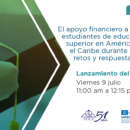Working conditions in higher education will be debated at the CRES+5

Decent work and living conditions of those involved in higher education make up Thematic Axis 7 of the CRES+5, the follow-up meeting to the III Regional Conference on Higher Education (CRES). This axis affirms that it is impossible to have quality higher education without ensuring the rights and working conditions established by the International Labor Organization, such as productive employment with fair wages, opportunities and equal treatment, social security and possibilities for personal development and social integration, among others.
In addition, the field of education has specificities that need to be taken into account when guaranteeing these rights, including emerging issues accelerated by the Covid-19 pandemic – such as the digitalization of education and its effects on routines, workloads and working hours. Thus, the tasks assigned to this axis include assessing the current situation of living and working conditions in higher education and proposing concrete ways to protect the rights and promote the well-being of all higher education workers in the region.
Decent work conditions was not originally one of the axes of the III CRES – held in 2018 in Córdoba, Argentina. It was included following a consensus between the UNESCO International Institute for Higher Education in Latin America and the Caribbean (UNESCO IESALC) and the Latin American and Caribbean higher education community after the 2022 World Conference on Higher Education- held in Barcelona.
The CRES+5 will take place at the International Convention Center of Brazil, in Brasília (DF), from March 13th to 15th.
Participants
The debates regarding Axis 7 will be led by: Paola Rebeca Arteaga López, general coordinator of postgraduate studies at the National Autonomous University of Mexico (Unam); Fabio Garcia Reis, director of innovation and networks at Semesp; Luis Bonilla Molina, full member of the Steering Committee of the Latin American Council of Social Sciences (Clacso); and Marcelo Di Stefano, executive secretary of the Confederation of University Workers of the Americas (Contua).
Base documents
The base documents drafts, resulting from the activities of the Working Groups (WGs) responsible for each thematic axis of the CRES+5, are now available. The fourth preparatory meeting for the Conference took place in Havana, Cuba, on February 7th and 8th. Drafts of these documents were discussed, the final version of which must be prepared by the WGs and made available on the CRES+5 website by March 6th.
CRES+5
The III CRES follow-up meeting is being organized by the Ministry of Education (MEC), through the Secretariat for Higher Education (Sesu) and the Coordination for the Improvement of Higher Education Personnel (Capes), and by UNESCO IESALC. The Conference’s target audience are rectors, directors, academics, workers, students, higher education networks, associations and professionals, research centers, trade unions, representatives of governmental and non-governmental organizations and all those interested in higher education on the continent.
CRES
The III Regional Conference on Higher Education, held in Córdoba (Argentina) in June 2018, adopted a Declaration and Action Plan 2018-2028. Following the World Conference on Higher Education in 2022, the region’s higher education actors assessed the need to hold a follow-up meeting to the III CRES, in order to promote a participatory process that would highlight the progress made, as well as the remaining challenges and emerging issues, especially related to the Covid-19 pandemic.
The CRES+5 will be the realization of this decision, allowing the analysis of the achievements of higher education in Latin America and the Caribbean. At the same time, it will establish priorities for the next Regional Conference on Higher Education – scheduled for 2028.
MEC Social Communication Office, with information from Sesu and UNESCO IESALC
RELATED ITEMS








